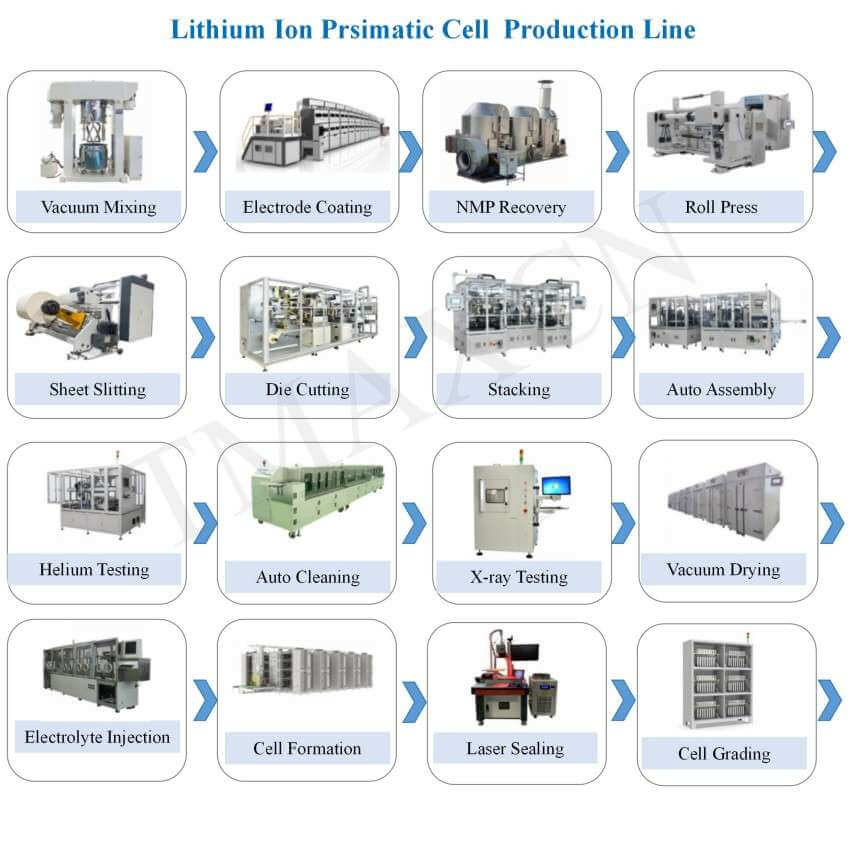مدونة الموقع
اتصل بنا
- إذا كانت لديك أسئلة، يرجى الاتصال بنا، وسيتم الرد على جميع الأسئلة
- البريد الإلكتروني : David@tmaxcn.com
- البريد الإلكتروني : Davidtmaxcn@gmail.com
- إضافة : No. 39, Xinchang Road, Xinyang, Haicang Dist., Xiamen, Fujian, China (Mainland)
المنتجات الساخنة
Electric Vehicle EV Car Battery Laboratory Line have had a profound impact on societal development, influencing various aspects ranging from technological innovation to environmental sustainability. Here are some key ways in which these facilities contribute to the broader social landscape:
Technological Advancements:
EV Car Battery Laboratory Plants are at the forefront of technological innovation in the field of energy storage. Their research and development efforts lead to breakthroughs in battery technologies, improving energy density, charging speeds, and overall performance. This technological progress not only drives the electric vehicle industry forward but also has a spill-over effect, influencing advancements in other sectors requiring efficient energy storage solutions.
Economic Growth and Job Creation:
The establishment and expansion of EV Car Battery pilot Line contribute to economic growth by creating jobs and fostering a skilled workforce. These facilities require a diverse range of professionals, from scientists and engineers to technicians and administrative staff. The growth of the electric vehicle industry, driven by advancements in battery technology, stimulates economic activity and helps build a robust ecosystem of suppliers, manufacturers, and service providers.
Green Energy Transition:
As society grapples with the challenges of climate change and environmental degradation, the development of advanced battery technologies in these labs plays a crucial role in the green energy transition. Electric vehicles powered by high-performance batteries contribute to reducing greenhouse gas emissions, air pollution, and reliance on fossil fuels. The societal benefits include improved air quality, reduced noise pollution, and a shift towards sustainable transportation alternatives.
Energy Security and Independence:
EV Car Battery Laboratory Plants contribute to enhancing energy security by promoting the adoption of electric vehicles and renewable energy sources. The transition from traditional internal combustion engines to electric vehicles reduces dependence on oil and opens avenues for cleaner, domestically sourced energy. This shift aligns with broader societal goals of energy independence and a diversified, resilient energy infrastructure.
Public Health Improvement:
The widespread adoption of electric vehicles, enabled by advancements in battery technology, has positive implications for public health. Reductions in air pollutants from conventional vehicles lead to improved respiratory health and a decrease in related illnesses. Additionally, the quieter operation of electric vehicles contributes to a reduction in noise pollution, further enhancing the quality of life in urban environments.
Global Collaboration and Knowledge Sharing:
EV Car Battery Laboratory Plants often engage in international collaborations and knowledge-sharing initiatives. This global exchange of ideas and expertise accelerates the pace of innovation and ensures that advancements in battery technology are accessible to a broader audience. It fosters a sense of shared responsibility in addressing global challenges and underscores the interconnected nature of technological progress.
Educational and Research Excellence:
These facilities serve as hubs for education and research excellence. They often collaborate with educational institutions, providing opportunities for students and researchers to participate in cutting-edge projects. This fosters a culture of continuous learning, skill development, and the cultivation of the next generation of scientists and engineers.
In summary, EV Car Battery production Line play a pivotal role in driving positive societal change. Their contributions extend beyond the electric vehicle industry, influencing economic, environmental, and public health outcomes, while fostering a culture of innovation and collaboration on a global scale.
 English▼
English▼





 +86 13174506016
+86 13174506016 David@tmaxcn.com
David@tmaxcn.com

